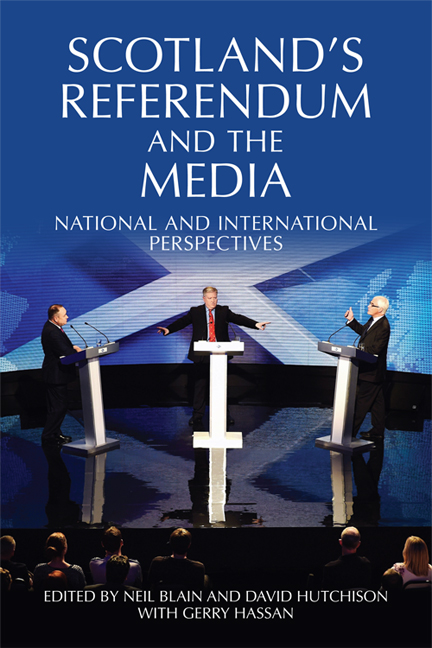Book contents
- Frontmatter
- Contents
- Preface
- Part One The Referendum in Scotland
- 1 The Unexpected Campaign
- 2 The Media Landscape in Scotland
- 3 Broadcasting and the Press: Some Key Moments
- 4 Scotland's Changing ‘Community of the Communicators’: The Political Commentariat and the Independence Referendum
- 5 The Scottish Press Account: Narratives of the Independence Referendum and its Aftermath
- 6 Scottish TV Coverage of the Referendum Campaign from September 2012 to September 2014
- 7 ‘Liked’, ‘Shared’, Re-tweeted: The Referendum Campaign on Social Media
- 8 Sport, Gender and National Identities
- Part Two Views from the UK
- Part Three International Perspectives
- Notes on the Contributors
- Index
5 - The Scottish Press Account: Narratives of the Independence Referendum and its Aftermath
from Part One - The Referendum in Scotland
Published online by Cambridge University Press: 05 August 2016
- Frontmatter
- Contents
- Preface
- Part One The Referendum in Scotland
- 1 The Unexpected Campaign
- 2 The Media Landscape in Scotland
- 3 Broadcasting and the Press: Some Key Moments
- 4 Scotland's Changing ‘Community of the Communicators’: The Political Commentariat and the Independence Referendum
- 5 The Scottish Press Account: Narratives of the Independence Referendum and its Aftermath
- 6 Scottish TV Coverage of the Referendum Campaign from September 2012 to September 2014
- 7 ‘Liked’, ‘Shared’, Re-tweeted: The Referendum Campaign on Social Media
- 8 Sport, Gender and National Identities
- Part Two Views from the UK
- Part Three International Perspectives
- Notes on the Contributors
- Index
Summary
The 2014 independence referendum was a major topic in the Scottish press for over two years. From the SNP's majority win at the 2011 Scottish election, which put it in a position to realise its longstanding policy of holding a referendum on independence, to the Edinburgh Agreement in October 2012, which gave the Scottish Parliament the power to hold the referendum, and the long campaign that led to 18 September 2014, all stages of the trajectory received considerable coverage in Scottish newspapers.
Even if they no longer enjoy the large readerships they previously commanded and many of them are struggling to remain profitable in a highly competitive market, Scottish newspapers have traditionally held an important position in the public sphere. There has always been a close relationship between the Scottish press and national identity, especially as Scottish affairs do not usually receive the same amount of attention in the UK-wide media. In the 1997 devolution referendum, voters surveyed said that they had paid considerable attention to the media during the campaign, and particularly read indigenous Scottish newspapers.
Scottish papers still see themselves as sharing a special relationship with their readerships by being close to the issues that matter to them. They also believe they are influential in Scottish politics and policymaking and saw the 2014 referendum as an opportunity to reaffirm their position in the national debate.
This chapter focuses particularly on editorial coverage, which expresses the official views of the newspapers, during the week before the referendum and the week after it. The days before the vote are important because coverage can still inform political decision making when the referendum is most topical, and this is also when newspapers declare their position on the vote. The days following the referendum are significant in demonstrating how newspapers responded to the outcome and how they see future developments.
A prominent issue in the political agenda in the final week of the campaign was the Better Together party leaders’ ‘vow’ promising increased devolved powers for Scotland in the case of a No vote. The increased devolution option was not officially on the ballot paper but had been previously discussed by the leaders of all three main UK parties during the campaign.
- Type
- Chapter
- Information
- Scotland's Referendum and the MediaNational and International Perspectives, pp. 46 - 58Publisher: Edinburgh University PressPrint publication year: 2016



